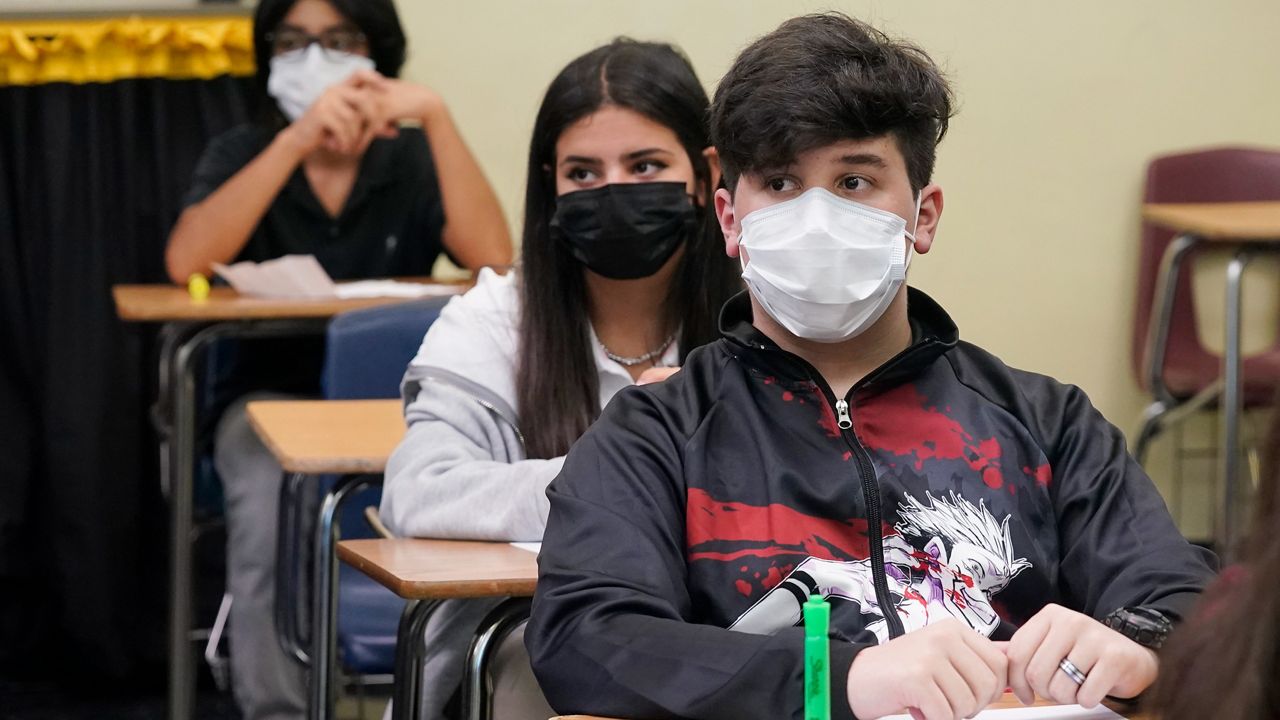More school districts in North Carolina are dropping indoor mask mandates. On Monday, Johnson, Chatham and several other county school boards voted to phase out or drop rules requiring students and staff to wear face masks inside.
State public health officials say schools should still require masks indoors. New guidelines from the Department of Health and Human Services say schools can stop contact tracing and should not require students and staff without symptoms to stay home.
The coronavirus situation continues to evolve in North Carolina, and the COVID-19 rules continue to change just as fast.
Daily coronavirus case numbers in North Carolina spiked in mid-January. DHHS reported about 3,400 new cases Monday, a significant drop from the almost 38,000 reported a month before.
The number of people in the hospital with COVID-19 is also dropping. Hospitalizations hit a record high of 5,206 on Jan. 26, according to DHHS. That number was less than 3,100 Monday. The number of people in the hospital with the virus tends to lag a week or two behind case spikes.
The omicron variant fueled the latest winter case spike. Public health officials say omicron spread much faster than earlier versions of the virus, but the symptoms were not as severe for most people. But because so many people got sick with omicron, the hospitals still filled up with COVID patients.
The fast-spreading nature and shorter incubation period of omicron means contact tracing in schools is not as effective, according to DHHS.
New DHHS guidelines in the StrongSchoolsNC toolkit do away with contact tracing in schools. The new guidelines go into effect Feb. 21.
“People with infections are most contagious prior to symptom onset and during the first few days of illness,” DHHS said.
Students, teachers and staff should no longer be required to quarantine when they are exposed to COVID-19, according to the new DHHS guidelines. Only people who test positive or have symptoms should stay home, DHHS said.
“Keeping kids in the classroom remains a top priority. As we have done throughout the pandemic, we evaluate which tools are most effective to protect students and staff,” DHHS Sec. Kody Kinsley said in a recent statement. “This is the right approach for this point in the pandemic and includes flexibility for local schools and health departments to use data to make informed decisions and respond to local conditions."
DHHS said school districts should still notify people who may have been exposed so people can get tested and take extra precautions.
The guidelines are used by many school districts in North Carolina to set coronavirus policies, but are not required by the state.
The DHHS guidelines still say everyone inside school buildings should wear a mask. But the rules are ultimately up to local school boards.
The North Carolina General Assembly required every school board to vote at least once a month on face mask policies. This month, several school districts have voted to phase out or end classroom mask mandates.
Several school boards voted Monday. In Johnston County, masks will be optional starting Feb. 21.
In Chatham County, school board members opted to phase out masks in a 3-2 vote. Starting Tuesday, athletes are no longer required to wear masks while playing sports events.
Masks will be optional in school buildings starting March 7. The school district said the March 7 date will give unvaccinated people a chance to get their shots.
“Numbers have been trending in the right direction,” Chatham County School Board Chair Gary Leonard said in a statement.
“We believe as more people have gotten vaccinated and their boosters, as well as nearing the end of winter, we can provide our staff and students with the choice of whether they want to wear a mask or not,” he said.
School boards in Iredell-Statesville, Cumberland and Harnett also voted to end mask mandates recently. Most of the biggest school districts in North Carolina, including Wake, Mecklenburg, Guilford and Forsyth counties, still require students and staff to wear masks indoors.
One other big change in the latest update to school guidelines from DHHS is what qualifies someone to be considered “fully vaccinated.”
The new guidelines define being up to date on COVID vaccines as: “Status of a person who has received all recommended doses of a COVID-19 vaccines, including additional doses and boosters.”
